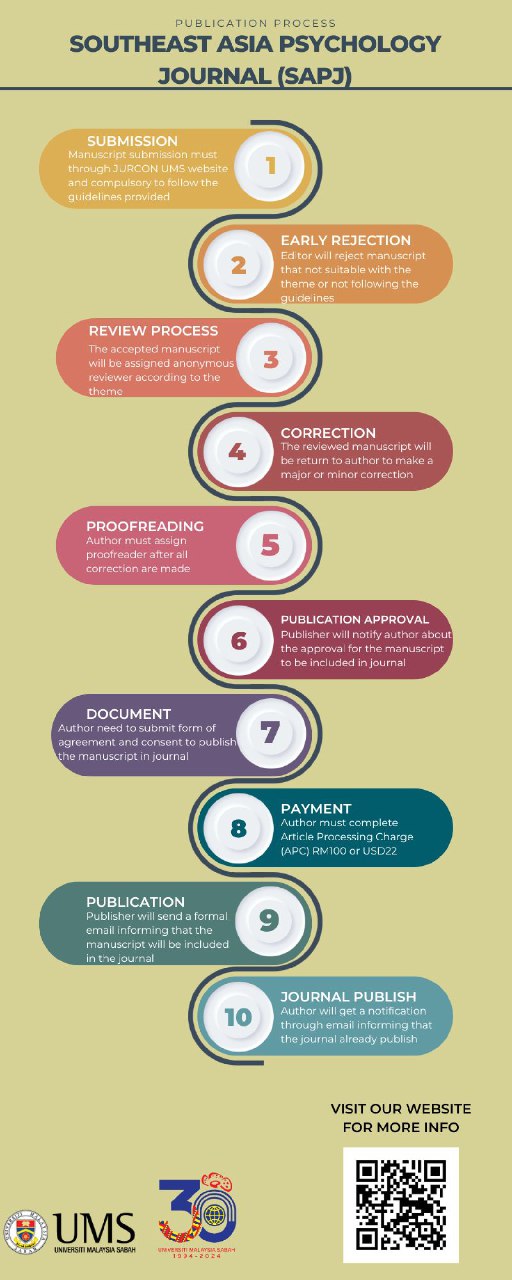PEMBENTUKAN MODAL INSAN: HUBUNGAN KONSEP KENDIRI, PERSONALITI, DAN PENCAPAIAN AKADEMIK PELAJAR SEKOLAH MENENGAH
DOI:
https://doi.org/10.51200/sapj.v8i2.5135Keywords:
Self-Concept, Personality, Academic AchievementAbstract
The purpose of this research is to determine the relationship between the self-concept and personality of students with academic achievement. The sample consist of 270 students from six secondary schools were chosen by using stratified randomly method in Kluang, Johor. The pilot study was done in order to determine the reliability and suitability of the questionnaires. Meanwhile Cronbach Alpha was used to determine the internal consistency of the questionnaires. The reliability value of Cronbach Alpha for the whole set of questionnaires used was 0.8432. The questionnaire for self-concept was modified from Tennesee Self-concept Scale by Fitts & Wareen (1996). Meanwhile the questionnaire for personality was modified from Personality Questionnaire by Eysenck & Eysenck (1975). The descriptive statistics such as frequency, percentages, and mean were used to analyze the dominant dimension in student’s self-concept. Other than that, inferential statistic such as t-test was used to analyze the difference between the self-concept and personality of students according to gender. Meanwhile, Pearson correlations were used at significant level 0.05 to analyze the relationship between self-concept and personality of students with their academic achievement. The research findings showed that the dominant dimension of self-concept was family self-concept. Besides, t-test analysis showed that there was no significance difference between dimension of self concept and personality of students according to gender. Pearson correlations analysis showed that there was no significance relation between dimension of self concept and personality with student’s academic achievement. Therefore, suggestions were made to increase the student’s self-concept and the tendency of their positive personality in order to enhance their academic achievement.
References
Azizi Yahaya, Mohd Najib Abdul Ghaffar dan Narinder Kaur A/P Peara Singh (2002). “Hubungan Di Antara Dimensi Personaliti dan
Konsep Kendiri dengan Pengaruh Keluarga Di Tanah Perancangan Felda. Laporan Penyelidikan, Pusat Pengurusan Penyelidikdan, Universiti Teknologi Malaysia, Skudai.
Becker, M., Mcelvany, N., & Kortenbruck, M. (2010). “Intrinsic And Extrinsic Reading Motivation As Predictors Of Reading Literacy: A Longitudinal Study”. Journal of Educational Psychology, 102, 773–785.
Fitts, W. H. & Warren, W. L. (1996). Tennessee Self-Concept Scale: TSCS: 2. San Diego, CA: Western Psychological Services.
Habibah Elias dan Noran Fauziah Yaakub (2002). (Edisi Kedua). Psikologi Personaliti. Kuala Lumpur: Dewan Bahasa dan Pustaka.
Häfner, Isabelle, et.al. (2018). “The Role of Family Characteristics for Students' Academic Outcomes: A Person-Centered Approach”. Child Development. July,Vol. 89 Issue 4, 1405-1422.
Lee, J. Q., McInerney, D. M., Liem, G. A., & Ortiga, Y. P. (2010). “The Relationship Between Future Goals And Achievement Goal Orientations”. Contemporary Educational Psychology, 35, 264279.
Mammadov, Sakhavat, Cross, Tracy L., Ward, Thomas J. (2018). “The Big Five Personality Predictors Of Academic Achievement In Gifted Students: Mediation By Self-Regulatory Efficacy And Academic Motivation”. High Ability Studies, December, 29:2, 111133.
Rohaty Mohd. Majzub (1992). Psikologi Perkembangan Untuk Bakal Guru. Kuala Lumpur: Penerbit Fajar Bakti Sdn. Bhd.
Rosander, Pia, Bäckström, Martin (2014). “Personality Traits Measured At Baseline Can Predict Academic Performance In Upper Secondary School Three Years Late”. Scandinavian Journal of Psychology, December, 55: 6, 611-618.
Sharifah Alwiah Alsagoff (1987). Psikologi Pendidikan II: Psikologi Pembelajaran dan Kognitif, Bimbingan dan Kaunseling. (Edisi
Ketiga). Petaling Jaya: Longman Malaysia Sdn. Bhd.








